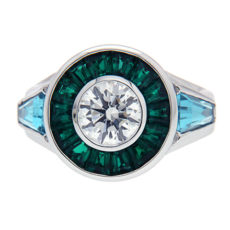Why Should you Invest in Certified Diamonds?
Your diamond solitaire engagement
ring is not merely an emblem of your love, but also an investment. It's only
intelligent that you invest in something credible and authentic as you fork out
big bucks on it. A certified diamond has been analyzed and graded for its
quality. Certified
diamonds are graded based on the parameters of 4Cs – Cut, Color, Clarity,
and Carat Weight.
A diamond certificate from a
reputable independent gem laboratory offers higher value and saves much
heartache if you plan to resale or upgrade. A certified diamond guarantees the
quality of the stone.
A diamond appraisal is NOT a
diamond certificate
Unscrupulous retailers will try
to pass off a regular diamond appraisal as the diamond certificate. However,
these are two significantly different documents. Typically, a diamond seller
creates a diamond appraisal highlighting its estimated value chiefly to deal
with insurance requisites. On the other hand, a diamond certificate is created
by a gemological laboratory analyzing and categorizing the gemstone's
attributes.
The value of diamond
certification
A certified diamond ensures a
confident and reliable purchase as the final decision is made based on the
qualities of the diamond and not the sales pitch of a retailer. A certificate
is even more crucial when you're buying online as it provides a clear idea
about the diamond you're buying.
• A certified diamond holds its
value better than non-certified gemstones, especially when it's upgraded and
resold
• Certification does away with
speculation. It simplifies the process of comparing two diamonds based on the
4Cs rather than solely relying on visual inspection
• When you're shopping for
significant savings, it becomes easier to trust online retailers if the diamond
comes with the necessary certification.
Buying certified diamonds
When buying a diamond, ensure
that the diamond certificate is issued by an independent, third-party
laboratory. Do not get convinced by a certificate generated by the diamond wholesaler,
jeweler, or the store as biased opinion can ultimately do more harm than good.
The third-party laboratory must
implement stringent grading methodologies and should have a solid reputation as
a service provider in the jewelry industry. Most jewelry retailers recommend
established and renowned names like Gemological Institute of America (GIA);
American Gem Society (AGS); European Gemological Laboratory (EGL); IGI; and
HRD.
Diamond clarity and cut
Clarity is critical when it comes
to brilliance in a diamond. While flawless is superlative, inclusions are the
'fingerprint' of a natural diamond. Look for a diamond with minimally
noticeable inclusions. The grading scale features FL to I3 with FL being the
finest.
The cut of a diamond is graded on
a scale from Poor to Excellent/Ideal. The finest of the cut grades represent
superior brilliance in a diamond.
Diamond color and carat weight
Colorless diamonds enjoy global
fame. Unless you are buying fancy colored diamonds, less color means better
diamonds.
Look for the largest carat weight
within your budget without compromising on the quality of the diamond. Larger
is not necessarily better.
Though a diamond's fluorescence
doesn't significantly affect its quality, ideally look for grades of None,
Faint or Medium.

Comments
Post a Comment